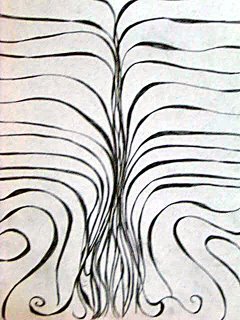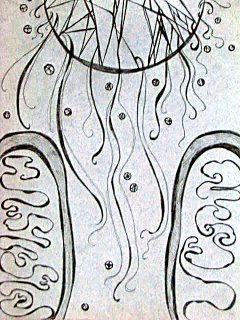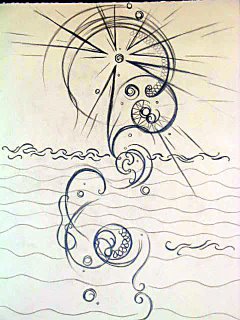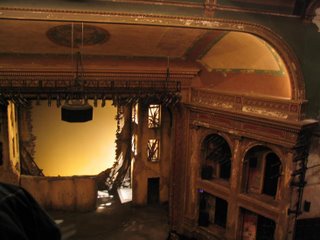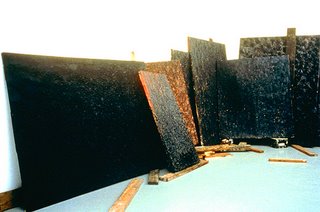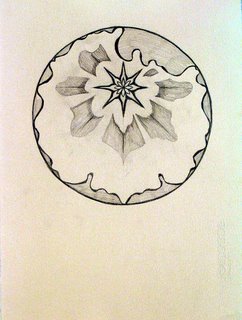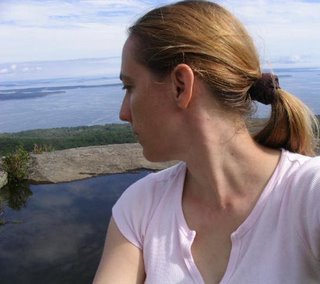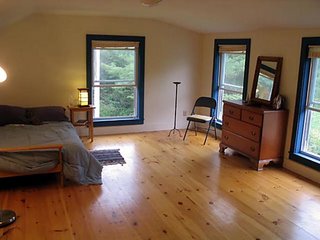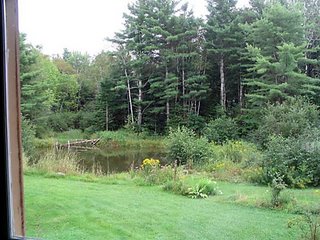
Jack the Dandy
shares my pre-Burning-Man sentiments:
Serena, I look forward to someday reading that extended riff. :) The art does sound spectacular, and that is the attraction. Otherwise, I already live in the desert, know its difficulties, and don't need to share them with thousands of other people.
Because I live here I don't see the desert as exotic or a tourist destination, I see it as my neighborhood, so I feel kind of out of place when I hear descriptions of the wonders of Burning Man. It's like, pardon the comparison, but the frat boys go to Tijuana to let loose. That doesn't mean there aren't many worthwhile things in Tijuana. But there's a little of a neo-hippy "go to this exotic locale to let loose" similarity in basic geographic imposition suggested in events like Burning Man, I think, no matter how queer or revolutionary or artistically redeeming.
At least, that's the kind of sensation I feel when I think about it. I should go some day, I guess. *shrug*
Oh, I SO know where you're coming from.
The friend of mine who dragged me to Burning Man, bless her heart, came back from her first Burning Man sojourn on a high. "You HAVE to go next year," she said. "We can do the Barbie-cue!"
(I have this very bad habit of not stating my vociferous objections to my friends' brilliant ideas for collaborative art projects up front. I don't want to be a wet blanket, squelch their creativity, be unsupportive, yah duh yah duh. I appreciate that they are where they're at, and that they have their Issues, which will not go away if I dismiss them out of hand. So I let the notion of making a gigantic Barbie doll and burning her in effigy, with much screaming and rending of garments, in order to symbolize our freedom from oppressive, patriarchal notions of female body image, just sort of hover there, unmolested.)
But right away, you have my first impression of the nature of Burning man. "Neo-hippy, go to an exotic locale to let loose like frat boys in Tijuana." Uh-huh. The more my friend raved about how friendly everybody was, about all the neat art projects, about community and consciousness-raising, free drugs and Critical Tits, the more I smiled on the outside and balked on the inside.
"All the women rode bicycles topless around the playa, then the men made us cocktails," she said. My friend is the sort of person who LIKES getting attention from strange men who ply her with alcohol when she's half naked. I'm not, so much.
But there I was, in the late summer of 2000, staying with this friend, rootless, and with a not-quite-ex-boyfriend who was panting to go. Also my other best friend, who loved loved loved playing dress-up, to the point where she would try my patience by staying about three hours longer in the cut-rate consignment fashion outlet than I could stand, which is hard to do. Also, my other best friend's fiancé, who had a jillion friends who were Burning Man regulars, and had a cooking rotation and huge communal tent all constructed and ready to go. I had no excuse. I was trapped.
But at least I have some experience with wilderness survival. While my two friends spent weeks trolling every vintage outlet, fabric store and costume shop in the city, pulling all-nighters making sexy and bizarre outfits for themselves, I phlegmatically dredged out the camping equipment, not forgetting essentials like insulite pads, zero-degree down sleeping bags, and sunscreen. I made sure I had comfortable shoes and plenty of layers. I planned meals and packed coolers. On the last day before we left, I found some high-quality body paint at a costume store in Berkeley, and decided I was ready.
My friends said, "Don't worry, the weather will be fine. It always is."
Hello? THERE IS A REASON THAT NOTHING GROWS ON THE PLAYA AT BURNING MAN. Wherever nature creates a perfectly flat, dry basin of nothing but fine, powdery dust, nature is harsh. That's nature.
So I don't know how much you know about the set-up at Burning Man. It's a very well-organized temporary city, arranged in a circle that is open at the top, with 'streets' marked out and named. There is no money exchanged between people, and no barter--everyone brings things to give away for free, and somehow it all works out.
And it DOES work out. When we arrived and found our camp, we pitched tents and started costuming ourselves. Some naked guys came over and explained that we should prepare to have our minds blown. We replied, "We're artists. This sort of thing is our normal state of consciousness."
It was true. I kept looking around and thinking, 'wow, somebody actually went and
manifested that.' There were at least two dragons--real dragons, huge gorgeous fire-breathing dragons, with scales and fangs and waving tails, which seated eight to twelve people. They didn't fly, but that was the only minor flaw. There was a huge sculpture that was a flaming metal ball on the end of a chain, attached to a tall pole, rotating so that the flaming ball wound up to the top of the pole, then curved out into an arc, and wound itself back up again, over and over. There was a giant fluorescent tie-dyed wind sock that you could walk (or dance) through, accompanied by colored lights and trance music. There were huge flowers like tree-houses, that you climbed up into and sat on shag carpeting inside, drinking free cocktails. There were giant tents as good as those of any nomadic desert tribe.
And all this is a description of roughly one percent of what's there.
The playa is the perfect backdrop for all this. It's impossible to take a bad photo there; even the hundreds of bicycles everywhere look like exotic, semi-living sculptures. It's the perfect flatness, the strong light, the uncompromising starkness. I sure wish my previous laptop hadn't been stolen with all of Pierre's photos on it, or I'd show you.
So anyway, my body paint was the perfect thing, both for my talents and my temperament. I installed myself comfortably in a big tent and started painting faces, backs and breasts. I didn't give people 'personas,' like Spider Man or anything; I just did fanciful, abstract curls and patterns and shapes, wandering wherever they would. After doing several, then holding conversations with people I'd painted, I realized that I seemed to be following energetic patterns in their faces, because the paint had a way of exaggerating their natural facial expressions as they talked. It was beautiful, simple and low-impact.
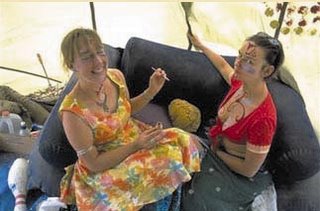
I also had the perfect excuse for getting out of Critical Tits. I painted about eight pairs of breasts, but oops! didn't get around to doing my own. The tits I painted were the Best In Show. Everyone got compliments.
While I was having such fun, though, my high-expectation friends seemed to be running aground. They had a long list of places and times that Exciting Events were supposed to be happening, and became increasingly stressed about what they might be missing. (The 'Menstrual March?' The 'Pseudo-Prom?' I ask you.) Worse, a major wind and dust storm blew up, and leaving the tent became inadvisable. I didn't mind at all; I just kept painting, happily ensconced.
I don't remember how long the wind blew; it might have been one day, might have been three. At any rate, by the time it cleared up, most of us had tent fever. My girlfriends in particular wanted to go Out; they hadn't shown off a tenth of the fancy outfits they'd created, much less seen enough of the fabulous art. So one evening, before the burn, we got gussied up, mounted our bikes, and went clubbing.
That was the evening we climbed the flower-houses, and encountered the bikes with the neon fish, and other things too surreal to recall. At one point we were crossing the open playa to the other side of the circle, and the belowmentioned fifteen-foot-high fantasy vehicle pulled up, lit from top to bottom in rainbow neon, bearing a large band. They launched into jazz or blues or rock n' roll, I forget what, we all boogied for five minutes or five hours, it was hard to tell, then they drove off again.
All in all, it was way more fun than I'd ever thought it could be.
But toward midnight, it began to rain, lightly. Some of us decided to press back to camp; some others decided to duck into a tent and wait it out, taking little sitting-up naps. Some of us got lost. The rain didn't stop; neither did it pour. It just got colder, and damper, and muddier.
The dust on the playa, as I have mentioned, is very, very fine. When it gets wet it makes very dense mud. Dense, heavy
, sticky mud. Mud that sticks to bicycle wheels and shoes.
First your bicycle wheels start spraying mud when you pedal. Then they get slow and hard to push. Then they stop turning altogether. Then you get off and push your bicycle; the mud sticks to your feet, until your feet are roughly the size, weight and shape of large bowling balls.
Then your bike becomes too heavy to push, pick up, or carry.
It was like trench warfare. One by one, my companions disappeared into the darkness, as though picked off by snipers. At last, I was trudging alone through the blackness, wet to the skin, dragging my thousand-pound bicycle, quietly declaring, "fuck. fuck. fuck." Blaming my vain girlfriends who wanted to go all the way to the other side of town to show off their sexy outfits.
I was rescued by two consecutive strangers, who carried my bike a few blocks, until finally ditching it a short way from camp. When I returned I found that I was the first to make it back; my resentment was somewhat mitigated as, snuggled in my zero degree down bag on top of my insulite pad, I listened to my fellow campers draggle in and attempt to get comfortable among their frou-frou accessories. They all had rough nights.
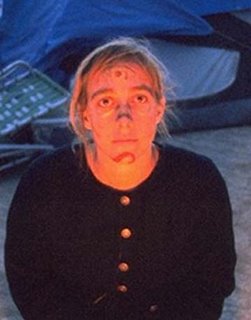
So those were the highs and the lows, inextricably intertwined. I did not take any drugs; they weren't necessary, for one thing, and for another you would have to be suicidal to even consider putting toxic substances into your body in that environment. People rallied in the morning, and we saw more great art, and only one person had a nervous breakdown. I enjoyed it, but swore never to go again unless I am really cozy with a person with a camper.
